‘Respect’s Jennifer Hudson On Portraying The Queen Of Soul And Honoring “How Universal She Is, And The Impact She’s Made”
- Oops!Something went wrong.Please try again later.
- Oops!Something went wrong.Please try again later.

Doing justice to a real-life person, as an actor, comes with its own set of pressures. Embodying a cultural icon, however, can be downright overwhelming. When Aretha Franklin personally gave Jennifer Hudson her blessing to portray her in the biopic Respect, the Oscar winner was elated by the vote of confidence. Then reality set in. “Those are huge, huge, huge shoes to fill,” Hudson says. “But if she said I can do this, I’m going to do my best.” Ultimately, the challenges of stepping into Franklin’s rich, complex legacy had a deeply beneficial effect on Hudson: “It inspired me to want to own my voice that much more.”
DEADLINE: To portray a real-life icon over the course of a lifetime must feel like a huge task. What are the challenges in that?
More from Deadline
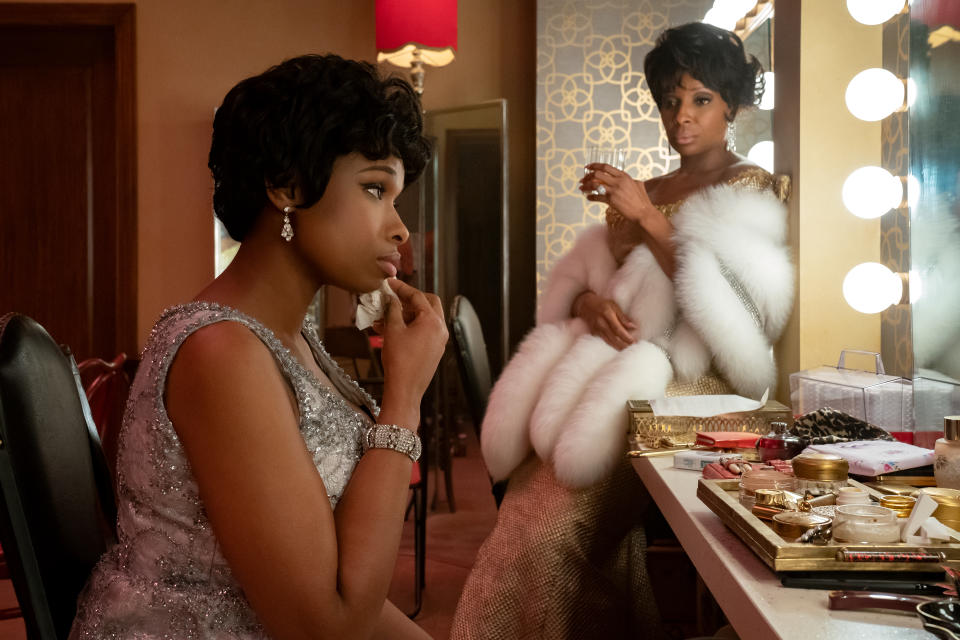
Quantrell D. Colbert/MGM
JENNIFER HUDSON: Well, first of all, when you consider what she represents to us all—and, being a fan, I obviously was very aware of how we all value her, how universal she is, and the impact she’s made—it’s like, oh my god, how do you approach this? What do you sing? And when you consider everyone in her life and everything in her life being iconic and legendary, it was so much to wrap my brain around. I literally still sit with it at times. If there was a Part 2, or if we shot her entire career, I would be filming for the rest of my life.
DEADLINE: Do you have to do just take the script and compartmentalize it into individual moments?
HUDSON: That was the approach. All I can try to do is live in that moment as she did. Let’s be present in each moment, where it can feel as authentic as it possibly can. Because it can’t be duplicated, but I can experience this version, keeping in mind what I’m trying to convey and portray. Even with the music, we had to approach it the same way she did, to live in the moment and try to make it as authentic as possible. At least that’s what I was thinking.
DEADLINE: When it comes to this particular film, how would you describe the spirit and essence of Aretha?
HUDSON: The most important thing, to me, was to maintain her faith throughout the journey of portraying her, and musically keeping the gospel. It does not matter what genre was she sang—and she sang every genre—gospel was always the base. Aretha used to always say, “I have to feel it.” And that’s something I say: It’s not about the sound, but how she made people feel through her music. Those things were key.
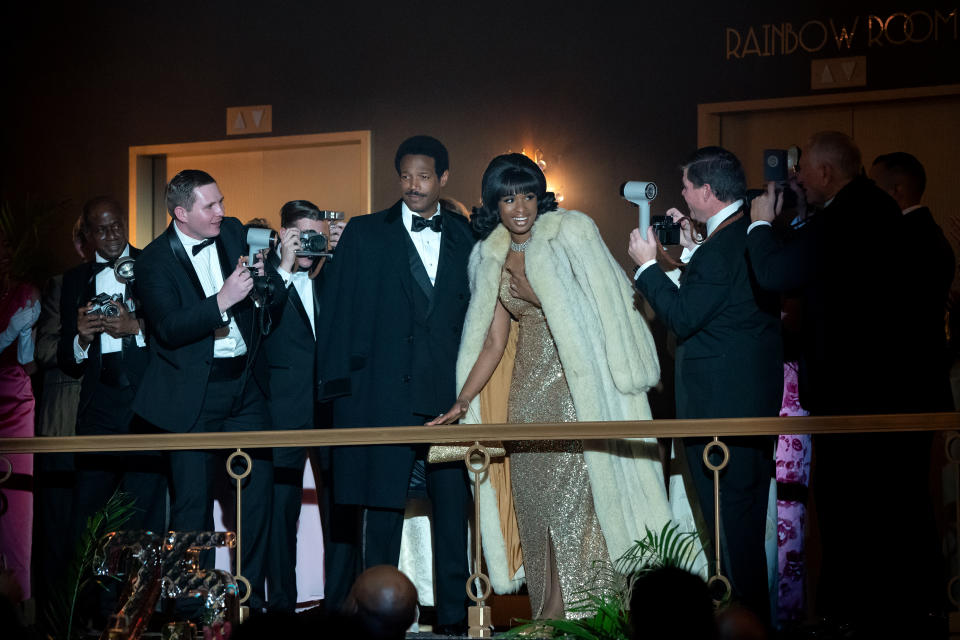
Quantrell D. Colbert/MGM
DEADLINE: You portray Aretha from 17 to 30 years old. What was it like to step into young Aretha and how do you feel she changes towards her thirties?
HUDSON: I love this question, because this is a biopic about a musician, so there’s a vocal timeline along with whatever’s happening [in her life]. Mind you, at this point, while filming, I am a 39-year-old woman that had to be singing like a 17-year-old girl. So, you’ve got to keep those things in mind. I worked with a dialect coach, Thom Jones, and we sat and listened to her when she was 22 years old. Then there was a clip of my American Idol audition, which was an Aretha Franklin song, and I happened to be the same age she was when she did Never Loved a Man. So, we studied that to see, where was my voice at that age? Where was her voice at that age? We were studying our instruments to figure out how to blend them to help create whatever sounds she may have had at that age, through my instrument.
DEADLINE: You, personally, sound more excited than nervous about the process. Was it a welcome challenge?
HUDSON: You know what, that’s a great observation, and I have to credit the whole crew, the director [Liesl Tommy], Clint [Ramos], the costumer. When they put you in those costumes and the hair and they set up the times, you become that. That was the trick: Let me not try to copy this or mimic something, let me live in this moment, too. When she first walked in the studio and she sang with the orchestra and she was singing “Accentuate the Positive”. Wow, what would I feel like in this moment? And just allowing what you feel to come through, versus trying to predetermine it. How would a young girl, at a time like this, feel to give a gift like that?
DEADLINE: Her physicality also changes over time. The way she speaks, the way she articulates, and the way she commands the room. How did you work on those changes as she gets older?
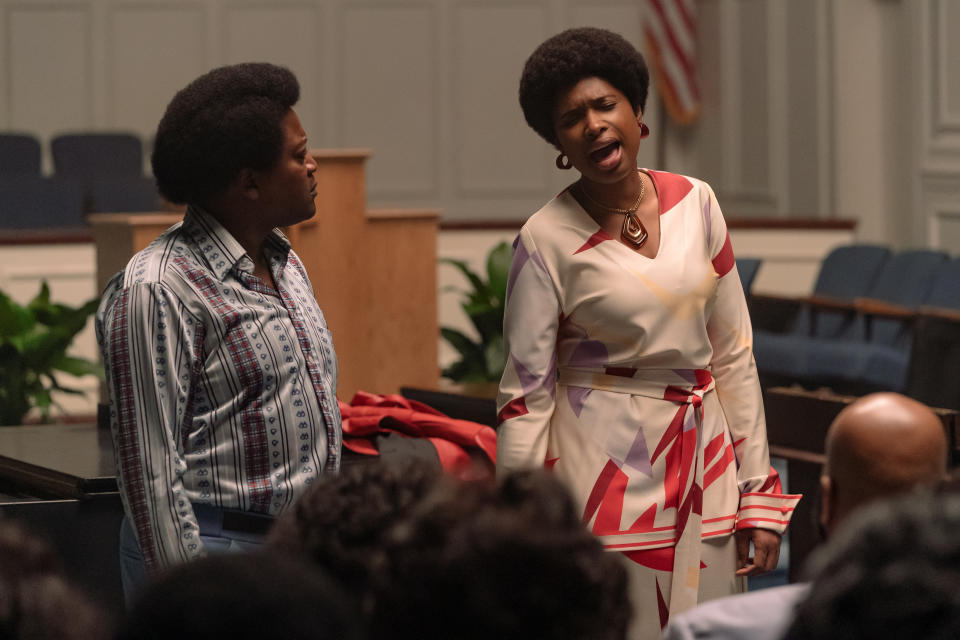
MGM
HUDSON: Working with the acting coach, Lelund Thompson, he pointed out how during that era, women weren’t allowed to take up space. But throughout the times, it gradually changed, and you see her womanhood evolve. You see her confidence grow. When it starts out, you have all these men leading—one of the scenes that really points it out is when they’re getting ready to work on “Never Loved a Man”. It starts off with Ted [White, Franklin’s ex-husband played by Marlon Wayans] in the front, but by the time you get to the end of the scene, Aretha’s leading it. You see that growth in the character, in that moment. You see her owning her space, taking up space. I always tell people, it wasn’t until the Queen of Soul owned her voice that we got our Queen of Soul. To me, it was in that moment when you really saw her take charge of her voice.
DEADLINE: What’s so interesting about Aretha Franklin is that she is this woman who commands a room and knows what she wants, but the men in her life, from her father C.L. (played in the film by Forest Whitaker) to her husbands, have such a powerful effect on her. Can you talk about portraying the juxtaposition of being a woman who is so confident in her own ability and still so at the mercy of the men in her life?
HUDSON: I think of that all the time. I can’t imagine what it must have been like to be a woman with a voice like that, that’s so powerful, so impactful, with that much strength and influence in it, but still not have a voice. She didn’t have the authority over it, because other people were steering it and using it for themselves. She was literally just the voice to execute it. Was it her words? Her feelings? Her thoughts? Her expressions? That’s something I thought about all the time. That had to be frustrating.
DEADLINE: What were those scenes like for you where she is at the mercy of her father or Ted?
HUDSON: It helped me understand her more. I’ve been able to be in her presence and get to know her, and it made things click for me. It inspired me to want to own my voice that much more. I couldn’t help but notice, especially the scene when she’s getting ready to go on tour and she’s sitting at the head of the table, and I don’t even think there was another woman in the scene. It was Aretha sitting at the table with all of these men conducting her life and her career. I was like, this feels so familiar to my life. I couldn’t help but to find it relatable, but at the same time, inspirational, to see her be the purpose of why everyone is in the room. Everyone is speaking for her, but nothing could happen without her. I remember getting ready to shoot, and I was like, “How am I supposed to portray this without words?” A lot of scenes are without words. It’s through expression. She bites her lips a lot, which meant she wanted to speak, but necessarily couldn’t. How do I tell this story without being able to express, the way I would? I needed to understand what she must have felt in those scenes to be able to tell the story with no words.
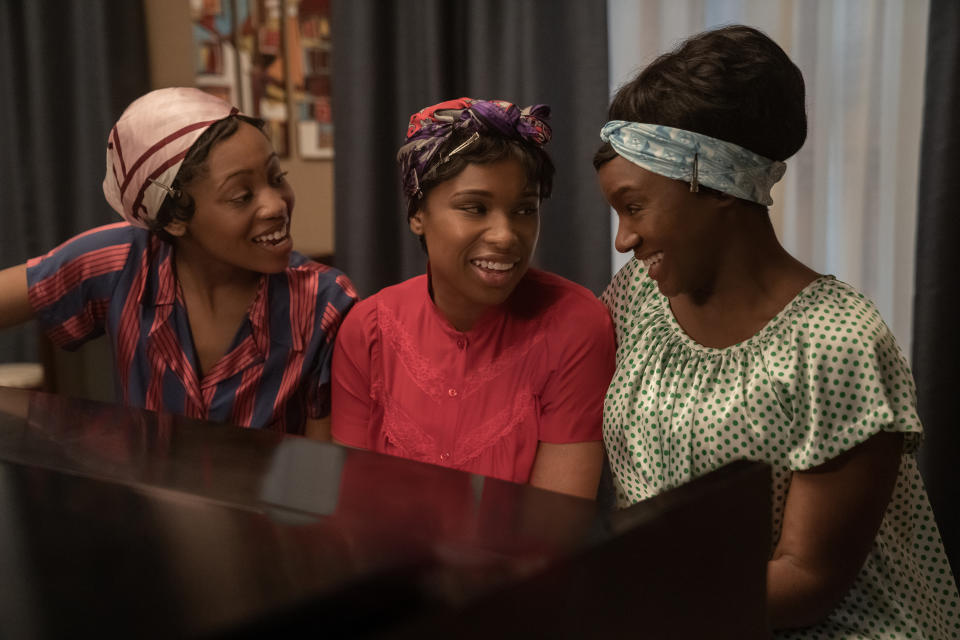
MGM/UAR
DEADLINE: In that moment, how much do you rely on your costars to carry some of the burden?
HUDSON: They carried a lot, let me say that. I don’t act, I react. Them being present in those moments, as actors, to make it authentic, to make it real… A lot of the fight scenes with Ted, or Marlon, it’s like, “Let’s make this as real and authentic as possible,” surprising us at times, where you couldn’t help but to get honest, natural reactions. Even though it’s acting, it is still happening to you. Being able to play off of each other in that way, everyone needed to be really there and present.
DEADLINE: There is always an interest in the technical aspect of embodying a real-life character. What is it like to emulate Aretha’s singing?
HUDSON: You know what, it was more like, how about we allow whatever musical influence that she’s had on me to shine through? Because you can’t emulate or imitate Aretha Franklin. I’m a fan, I know. This is a huge assignment, but if she said I can do this, okay, I’m going to do my best. It’s maintaining what we know of her, what we all treasure her for, and those nuances, musically, her technique, her skill, those signature riffs, the feeling, her gospel roots. All of those things are, to me, the signature things that needed to be present. Also, the biggest challenge is that all of these songs are iconic. These songs are special to the world—think about “Natural Woman”, “Respect”—so we have to maintain the base of those songs and not take it too far out of context and allow her nuances and her signatures [to emerge]—little things that we know: licks, how she enunciates the ‘s’s and the diction.
DEADLINE: When Aretha Franklin said that she wanted you to play her, did that feel like enormous pressure or was it freeing, in that you have her vote of confidence?
HUDSON: Both. It’s like, “Oh my god, the queen, Aretha wants me to play her. Yay!” And then it’s like, “Oh Lord. Oh my god, how?” Those are huge, huge, huge shoes to fill. I don’t take it lightly. The weight and the impact of her legacy is why this is the most personal project to me, which is why the only way to honor this is to approach it in the most honest and authentic way I possibly can and with as much respect as I can.
DEADLINE: What do you recall of the time that you were able to spend with her? And was she there when you were prepping for the role, or did all of these things happen before the movie came about?
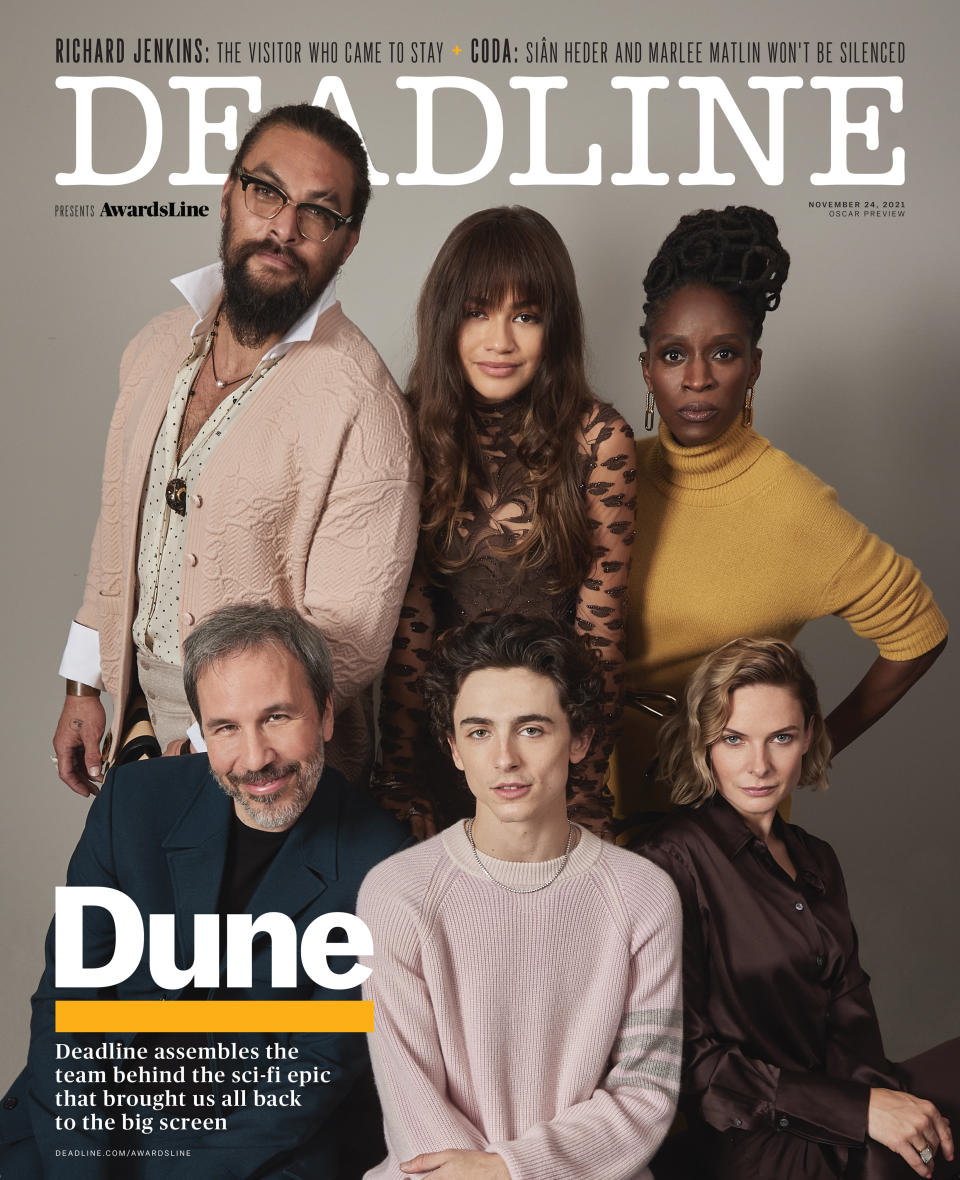
HUDSON: We had our first conversation about me playing her two years after I won the Oscar for Dreamgirls. I’ll never forget it. It’s always been in the back of my mind. Anytime I would come out and tribute her, I looked at it as my audition. We did speak about it all the way up to her passing. I miss hearing from her. I would hear from her weekly. But unfortunately, she passed before we started the whole process.
DEADLINE: What are you most proud of when it comes to this movie and your performance?
HUDSON: Well, first, that the Queen of Soul, herself, said, “Jennifer, do this.” That’s the thing that got me through it. And I feel as though all the greats, from Aretha to Whitney to Prince, I’ve been blessed to get to know all of them, those that have passed on. They have given us so much, so much. So, if there’s anything I can do to continue to honor a legacy such as Ms. Franklin’s, I just would love to continue to do that. And I just hope she knows, and the world knows that it is from the heart and with the utmost respect, if nothing else. I know we all have a respect for Ms. Franklin, but by the time you get to the end of this film, I hope everyone has a newfound respect for her.
Best of Deadline
New On Netflix For December 2021: Day-By-Day Listings For TV Series, Movies & More
New On Amazon Prime Video For December 2021: Daily Listings For Streaming TV, Movies & More
Most Popular Netflix Movies & TV Series, Ranked By Total Viewing Time
Sign up for Deadline's Newsletter. For the latest news, follow us on Facebook, Twitter, and Instagram.

